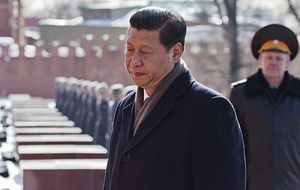Generally, when the Chinese military does something particularly bold, such as intercept a U.S. spy plane or barge into India-administered Kashmir, inevitably some analysts explain this behavior by suggesting that the Chinese military has gone “rogue.” In other words, there is a tendency to explain off Chinese aggression by pointing to a failure in the chain of command that results in miscommunication (or in some cases, non-communication) between the leadership in Zhongnanhai and field commanders. After the most recent manifestation of this sort of explanatory bias, following the U.S.-China spy plane intercept incident, Zachary Keck pushed back against this notion of rogue PLA officers. I tend to agree with this view as well–the Chinese military, after all, is subservient to the Chinese Communist Party, and Xi Jinping, as president, presides over the Central Military Commission.
It turns out this may be more of how things are supposed to work in the Chinese military chain of command on paper. In reality, the “rogue” theorists may be right.
New evidence supports the commonly held view that the Chinese military isn’t entirely in line with the party leadership. Recently, President Xi Jinping delivered a speech at the PLA headquarters in Beijing with PLA chiefs of staff present. Notably he delivered this speech following his return from his South Asia tour which featured a particularly interesting visit to India when PLA troops crossed into India-administered Kashmir as Xi arrived in the country. In his speech, Xi unusually emphasized the importance of the PLA’s “absolute loyalty and firm faith in the Communist Party of China,” according to Xinhua.
Further supporting the idea that there may be some commanders in the PLA who have acted without the consent of the party leadership, Xi emphasized the need for a “smooth chain of command” and called on field commanders to “make sure all decisions from the central leadership are fully implemented.” In a particularly telling paraphrasal, Xinhua notes that Xi suggested that “Military commanders should have a better understanding of international and domestic security situations as well as the latest military development.” According to Xinhua, Fang Fenghui, chief of the PLA general staff, was in attendance, along with other senior Chinese military leaders. A statement following Xi’s speech noted that “All PLA forces should follow the instructions of President Xi Jinping, also chairman of the Central Military Commission (CMC), and update their operations to meet new goals and missions set by the CMC.”
In light of Xi’s remarks, it seems highly likely that PLA leaders have at times acted without the consent of the Communist Party’s senior leadership and, more critically, against the strategic vision of that same leadership. It is, of course, nearly impossible to ascertain the extent to which the PLA may have drifted from the party leadership without veering dangerously close to baseless speculation. All we know is that Xi Jinping, the general secretary of the Chinese Communist Party and the chairman of the Central Military Commission, felt it necessary to issue a statement to the People’s Liberation Army that, in effect, says “Please listen to me.”
In light of Xi’s remarks, it may bear reconsidering the verity of, for example, him telling Indian Prime Minister Narendra Modi that he honestly did not know the details of the stand-off between Indian and Chinese troops in Kashmir as the two leaders met. The fact that Xi felt it necessary to deliver these remarks and issue a statement to the PLA immediately upon his return from India suggests that the Chinese incursion in Chumar may not have been carefully coordinated after all.
The one oddity in all this is why we’re hearing about this speech at all. If Xi is truly concerned by lapses in China’s chain of command and fears that his leadership over the military is not absolute, why broadcast it via a report in state media? For a state apparatus so concerned with saving face, it’s somewhat curious that Beijing would choose to willingly broadcast these sorts of lapses in leadership to the outside world. Xi, like Hu Jintao before him, has issued statements expressing displeasure with the military before, but the frank language and the fact that the remarks were delivered following the incident in Kashmir between Indian and Chinese troops suggest that this time things might be different. One explanation might be that this speech and the report could be engineered specifically for consumption by the outside world. After all, given recent incidents involving Chinese troops in India, Southeast Asia, and the East China Sea, it may grant the leadership in Beijing some plausible deniability by suggesting that these actions were not sanctioned by the top leadership in Beijing. Of course, by the same token, this same admission makes Xi look weak in a way very much contrary to the image he has cultivated for himself (it is almost cliche to refer to Xi as anything but the 21st century reincarnation of Deng Xiaoping).
Unfortunately for many of China’s neighbors, neither explanation of Chinese military behavior–be it top-down carefully planned strategy or “rogue” field commanders–is particularly comforting. Leaders and strategists in India, Japan, Vietnam, the Philippines, and the United States will be less interested in cracking open the black box that is the Chinese military and more interested in responding effectively to China’s increasingly assertive military behavior.

































